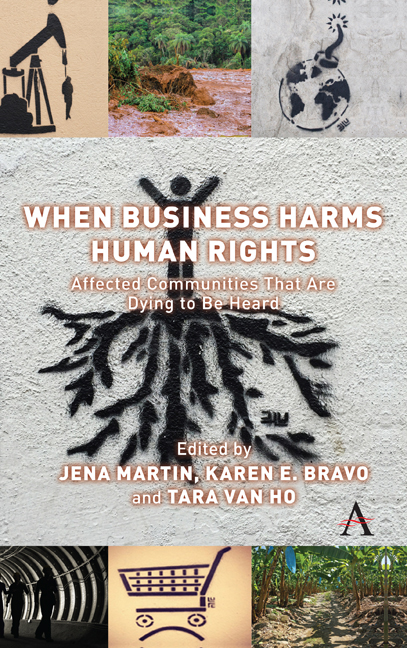Book contents
- Frontmatter
- Contents
- Preface
- Acknowledgements
- Introduction
- Chapter 1 Complicity in False Arrest, Imprisonment and Theft by a Fairtrade-Certified Company
- Chapter 2 Hindrances to Access to a Remedy in Business-Related Cases in Colombia: The Case of Gilberto Torres
- Chapter 3 The Global Pursuit for Justice for DBCP-Exposed Banana Farmers
- Chapter 4 The Rupturing of the Dam and the Community’s Social Fabric: A Testimony from an ‘Atingido’ from Bento Rodrigues, Brazil
- Chapter 5 Taming the Dragon, Unpacking Options for Access to Remedy for Violations by Chinese Multinational Corporations Operating in Chiadzwa, Zimbabwe
- Chapter 6 Máxima Acuña: The Story of How a Business Impacted Human Rights Defenders
- Chapter 7 Community Interrupted, ‘Life Projects’ Disrupted: Cajamarca, Ibagué, and the La Colosa Mine in Colombia
- Chapter 8 Occupational Health as a Human Right: A Case Study in a Turkish Free Trade Zone
- Chapter 9 The Price of the ‘Black Dollar’: Veteran Coal Miners and the Right to Health
- Chapter 10 Abandoned: A Tale of Two Mine Closures in South Africa
- Conclusion
- Appendices
- List of Contributors
- Index
Chapter 3 - The Global Pursuit for Justice for DBCP-Exposed Banana Farmers
Published online by Cambridge University Press: 20 January 2022
- Frontmatter
- Contents
- Preface
- Acknowledgements
- Introduction
- Chapter 1 Complicity in False Arrest, Imprisonment and Theft by a Fairtrade-Certified Company
- Chapter 2 Hindrances to Access to a Remedy in Business-Related Cases in Colombia: The Case of Gilberto Torres
- Chapter 3 The Global Pursuit for Justice for DBCP-Exposed Banana Farmers
- Chapter 4 The Rupturing of the Dam and the Community’s Social Fabric: A Testimony from an ‘Atingido’ from Bento Rodrigues, Brazil
- Chapter 5 Taming the Dragon, Unpacking Options for Access to Remedy for Violations by Chinese Multinational Corporations Operating in Chiadzwa, Zimbabwe
- Chapter 6 Máxima Acuña: The Story of How a Business Impacted Human Rights Defenders
- Chapter 7 Community Interrupted, ‘Life Projects’ Disrupted: Cajamarca, Ibagué, and the La Colosa Mine in Colombia
- Chapter 8 Occupational Health as a Human Right: A Case Study in a Turkish Free Trade Zone
- Chapter 9 The Price of the ‘Black Dollar’: Veteran Coal Miners and the Right to Health
- Chapter 10 Abandoned: A Tale of Two Mine Closures in South Africa
- Conclusion
- Appendices
- List of Contributors
- Index
Summary
Introduction
Almost four decades ago, thousands of Filipino banana plantation workers were exposed to a sterility-inducing nematicide called dibromochloropropane (DBCP) used by the subsidiaries of transnational corporations (TNCs) operating in the Philippines. This chemical was employed in the farms by these corporations even though it was already banned in the United States. As a result, those plantation workers filed several lawsuits against the nematicide manufacturers and the TNCs before Philippine and US courts. While a few of them were able to obtain out-of-court settlements, the majority remain uncompensated for the injuries that they have sustained. The chapter takes us to the experiences of Digong who is one of the numerous former plantation farmers rendered sterile by DBCP and narrates the legal battles of ex-farmers like him against these huge fruit corporations and chemical manufacturers.
These TNCs take advantage of the failure of the domestic legal regimes, both in the United States and the Philippines, to provide an effective judicial remedy to these farmers. The callousness of these TNCs is manifested by their refusal to recognize and appear before Philippine courts while at the same time advocating for these same trials to be removed to Philippine courts when the farmers sued them in US courts. The legal manoeuvres employed by these corporations means that the farmers would have to shell out significant litigation expenses and exhaust their precious time – making it practically impossible to obtain relief for their injuries.
By having the cases referred back to the Philippines, these corporations already won half the battle. First, the Philippine judiciary has been marred by widespread corruption and suffered from debilitating inefficiency. Second, it46 is more difficult to impute liability on the parent corporation for the acts of its subsidiary since Philippine case law has a higher threshold before the courts to ‘pierce the corporate veil’ so to speak. Third, even if the farmers win the case the amount of damages to be awarded would most likely be minimal since it would be based on the average compensation of a Filipino farmer.
With the current legal framework in the Philippines, the plaintiffs would be better off initiating the action before the courts of the country of origin of the parent corporation rather than before Philippine courts.
- Type
- Chapter
- Information
- When Business Harms Human RightsAffected Communities that Are Dying to Be Heard, pp. 45 - 56Publisher: Anthem PressPrint publication year: 2020



